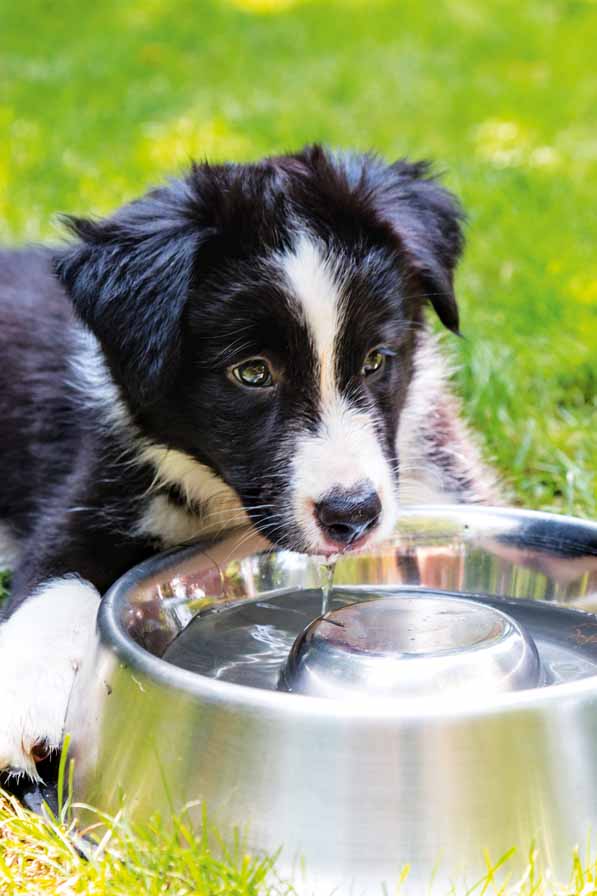
Aah-choo! If spring and summer set you sneezing, spare a thought for those dogs battling allergies all year round, writes Laura Greaves.
For many people, sneezing, red eyes and itching are a cross to bear every spring but Chase isn’t a person, he’s a five-year-old Hungarian Vizsla — and he has to put up with these unpleasant symptoms year-round.
Chase also suffers from skin redness and “hot spots”, throat irritations, red eyes, excessive mucous and a smelly coat, all of which are caused by environmental and food allergies. “Chase’s allergies include pollen, plants and some cleaning products, as well as food,” says the stoic pooch’s owner, professional dog groomer Bianca d’Avoine.
Chase also has a muscle wasting condition called myositis, which is believed to be caused by autoimmune factors. As his allergies have worsened, so have the effects of the condition. “I own a dog grooming salon and have seen a lot of allergic dogs, but it wasn’t until my own dog started suffering from allergies that I realised how hard they are to treat,” says d’Avoine, from Melbourne.
What causes allergies?
Sadly, Chase isn’t alone in his allergy misery. While dogs don’t suffer from seasonal hay fever in the same way we humans do, allergies are surprisingly common in the canine community and they usually manifest as skin irritations. “There are some dogs that can have the symptoms we associate with allergies in people but the most common presentation we see in dogs is allergic skin disease,” says Dr Rusty Muse, visiting veterinary dermatologist at WA’s Murdoch University Veterinary Hospital
“These dogs are paw lickers, they rub at their eyes and face and get recurrent ear infections. They have itchy armpits and sides.” An allergic reaction occurs when the body incorrectly registers a harmless everyday substance as dangerous. While it’s not known exactly what causes allergies, Dr Muse says allergy-prone dogs tend to have more mast cells than itch-free hounds. “The mast cells, which are the ‘allergic cells’, tend to be in higher numbers in the skin and when they get stimulated by contact with allergens we see the release of histamine in the skin, which makes dogs itchy,” he explains.
Some breeds are genetically more likely to develop allergies. These include terriers — particularly West Highland White Terriers — Labradors, Golden Retrievers, Boxers, Rottweilers and German Shepherds. Allergies can be triggered by environmental factors, foods or insects, and dogs may be susceptible to just one of these or a combination. Common environmental triggers include grasses and trees, pollen and dust mites. “With dogs whose triggers are environmental, they may be very sensitive to something like eucalyptus, so they present at certain times of the year. Other dogs have things like dust mite allergy, so they’re itchy all year round,” he says.
Foods that commonly cause allergic reactions include beef, chicken, corn, wheat and soy. Symptoms of food allergies can also include skin irritation, as well as vomiting and diarrhoea. “Food is actually a fairly uncommon allergen. Probably only ten to 15 per cent of dogs are food allergic.” The most common insect allergy trigger is fleas. Signs of flea allergy include itching, scratching and hair loss across the dog’s rear end, tail and back legs. “Flea allergy is a separate thing and is also quite uncommon. It’s not that these dogs have a lot of fleas but they’re allergic to a component of flea saliva and strict control becomes really critical,” Dr Muse explains.
Treatment options
Most allergic dogs start to display symptoms between one and three years of age. While few are ever entirely “cured” of their allergies, there are plenty of diagnostic and treatment options available that can make Fido a lot more comfortable. Dogs with suspected food allergies will be put on an elimination diet that aims to isolate the specific ingredient causing the problem. This helped d’Avoine hone in on the cause of Chase’s digestive woes.
“The first thing I tackled was his diet. I started him off on a bland diet of rice, chicken and some vegetables. Once his digestive symptoms cleared up, I slowly started to introduce different foods into his diet to see what did and did not affect him,” she says. “I found that most dry foods affected him, except one specifically formulated for sensitive skin. I also discovered a dog food roll that contains pre and probiotics. With his diet as natural as possible it became easier to get his digestive symptoms under control.”
For environmental allergens, skin-prick testing is used: a tiny amount of allergen is injected under the superficial layers of skin to check for a reaction. “Once we pinpoint the things a dog reacts to and confirm that it has antibodies to it, then we can make a vaccine,” says Dr Muse. The vaccine is administered in a series of regular injections designed to desensitise the dog to the allergen. “Desensitisation programs (vaccination) are the best and safest approach long term and they are effective in 65 to 75 per cent of cases. For a genetic issue, that’s very high,” he says.
Vets can also prescribe antihistamine medication and corticosteroid drugs, which can be very effective in the short term but tend to be less successful and may cause side effects over time. Dogs with allergic skin disease are also more prone to secondary skin infections. Allergies left untreated don’t necessarily lead to other, more serious conditions, but they will certainly make for an unhappy four-legged friend. “Allergic dogs that don’t receive appropriate treatment lead pretty uncomfortable, miserable lives. It can also cause problems for the owner because it disrupts the canine-human bond,” Dr Muse says.
Thanks to d’Avoine’s efforts, Chase’s allergies are now under effective control. As well as his natural diet, she also uses natural products to ease his itching and administers antihistamines and eye ointment at certain times of the year. “Chase is a happy-go-lucky dog and seems to cope well with his allergies,” d’Avoine says. “It’s important to be persistent and not give up. Even the smallest change can have an effect on your dog’s allergies, so start small on treatment because in the end it all adds up.”
I’m allergic to… grasses and pollen!
Certain greenery causes four-year-old English Cocker Spaniel Coconut to itch, scratch and sneeze, says his owner, Jane Stabler. “I was at the vet for something else and I mentioned how much ‘Cokes’ had been sneezing and licking his paws and legs. The vet had a look at him and diagnosed hay fever. I had no idea this was something that can affect dogs — I just thought he had a cold.
“As Coconut is now fully grown, it seems his allergies will be something he’ll have to live with forever. He was prescribed an antihistamine drug called Phenergan, but it turns him into a zombie. He just gets on with things, unless I’ve given him his medication, in which case he basically sleeps all day. I also try to keep his hair fairly short during spring and summer, so he’s less likely to carry a lot of pollen in his fur, and I take him to the beach more; I know that my allergies seem less intense by the ocean, so I just hope it’s the same for him.
“I do feel bad when I see him licking his legs because I know he must be irritated. Managing Coconut’s allergies isn’t expensive or difficult, but it’s tough knowing he’s uncomfortable either way. I’m a terrible hay fever sufferer, so I can only imagine how he feels given he’s so much closer to the ground and all that pollen. Definitely talk to your vet if you think your dog shows any signs of allergies. They can’t tell us what’s wrong, so we owe it to them to try to make it as bearable as possible.”
I’m allergic to… chicken!
Lauren Ashton’s beloved three-year-old Staffy, Indi, suffers digestive upsets as a result of her chicken allergy. “For a while we thought Indi was just a sensitive Staffy, as they often have issues with their skin and tummies. But when she was about six months old we suspected there may be more to it as she suffered from constant vomiting and bouts of diarrhoea,” says Lauren. “Each time we took her to the vet we were told that she likely had a food allergy, and that we should put her on ‘gut rest’, feeding her rice and chicken until the symptoms died down.
“Finally we put her on an elimination diet, which consisted of a strict regimen of hypoallergenic dry dog food and nothing else for six weeks. When we started to reintroduce proteins to her diet, it didn’t take long to discover the culprit had been chicken all along. Her vet then advised us to feed her on a type of protein she’d never had before, kangaroo. Her diet now consists mainly of fresh kangaroo meat and mashed sweet potato. I feel very proud of our efforts in identifying the cause of Indi’s symptoms — it was a tough slog for a while trying to eliminate everything from her diet, especially when those puppy eyes were begging for a treat, but it was all worth it in the long run.”
I’m allergic to… protein!
Proteins found in most commercial dog foods cause itchy rashes and conjunctivitis for Louise Nealon and Tiffanie O’Neill’s two-year-old Glen of Imaal Terrier, Alby. “Alby’s allergy seems to be related to his breed. Glen of Imaal Terriers can’t tolerate more than 20 per cent protein in their food and the lowest amount of protein you can find in commercial food is 22 per cent. Most commercial foods and treats cause him to have symptoms including recurrent conjunctivitis and severe itching and pustules all over on his stomach that scar when he scratches them,” say Nealon and O’Neill.
“We consulted a US-based researcher who has studied the specific nutritional requirements for each dog breed. He recommended a specific Glen of Imaal diet for Alby based on foods native to Ireland, where the breed originated, and supplements. The diet is home cooked and it takes about three hours to prepare his batch for the week, but as soon as we started feeding it, Alby’s itching and conjunctivitis stopped.
“To soothe his skin, we bathe him once a month with a very gentle hypoallergenic shampoo. We also have a special spray for his skin when it is particularly irritated. I’d recommend exploring all the options one by one and when you find something that works for your puppy then stick to it.”
I’m allergic to… dust mites!
Three-year-old French Bulldog Scherbotsky is unlucky enough to be allergic to dust mites, grasses and certain trees, says her owner, Lisa Shapiro. “Scherbotsky’s main symptom is that her skin is incredibly itchy, so she’s either constantly scratching herself or looking for other ways to ease the itch, like rubbing her body against furniture, carpet and even people’s legs,” says Shapiro. “This often exacerbates things because it breaks the skin, which can become infected and require antibiotics.
“I first noticed her incessant itching when she was about one and would often smell really bad a day or two after a bath. I took her to the vet on a number of occasions and she was prescribed antibiotics for the skin infections that caused the foul smell, but this didn’t treat the underlying allergies. I’ve explored a number of different options to treat and manage Scherbotsky’s allergies, starting with an elimination diet after a vet suggested that she may be allergic to her food. I also tried things suggested by concerned family and friends including bathing her in chamomile tea — she smelled delicious but it didn’t help her allergies. I’ve tried five or six medicated shampoos and also corticosteroids.”
The triggers for Scherbotsky’s allergies were finally diagnosed when she was almost two, after she was seen by a specialist canine dermatologist. “I was sent home with a collection of needles and serums with which to inject her as a process of desensitisation. I found it incredibly daunting as I’d never had to inject anything before and wasn’t sure if I was doing it correctly or hurting my dog, but I followed the injecting regimen for four months with little benefit,” says Shapiro.
“I wish there was something I could do to simply take her allergies away. It’s very hard to see my ‘fur baby’ so unhappy and uncomfortable. It has also made me feel very embarrassed when I take her out and she starts doing what can only be described as an army crawl along the floor in order to scratch her belly. Scherbotsky now takes a quarter of a cortisone pill every three days and her skin allergies are under control. It’s been months since she last needed antibiotics for a skin infection and she also seems much happier.”







